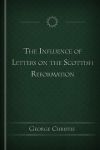Classic Studies on the Scottish Reformation (7 vols.)
Digital Logos Edition
Overview
In the 1500’s, the Scottish Reformation completely altered the religious climate of Scotland. As a major component of the European Protestant Reformation, the political build-up to Scotland’s shift from Catholicism to Protestantism involved nearly all of Europe, and this shift remained a major source of tension centuries later. This period in Scotland reflects an explosive social and political atmosphere, full of dramatic changes in perspective. The Classic Studies on the Scottish Reformation collection offers an easily accessible compilation of texts examining this powerful time in Scottish history. Each text contains an entirely different point of view, allowing this period to be studied from every angle.
This title is included in the following collections
You can save when you purchase this product as part of a collection.
Logos 8 Reformed Platinum Lega...
$1,499.99$1,499.99Logos 5 Reformed Platinum Lega...
$1,499.99$1,499.99Logos 9 Reformed Platinum Lega...
$1,499.99$1,499.99Logos 8 Reformed Diamond Legac...
$2,999.99$2,999.99
- $2,999.99
- $2,999.99
- $2,999.99
- $4,749.99$3,562.49
- $4,749.99
- $4,749.99
- $4,749.99
- $23,999.99$17,999.99
- $21,749.99
- $24,999.99

- Multiple perspectives on the events of the Scottish Reformation
- Examinations of political, religious, social and literary influences on the Reformation
- Original texts based the best authorities available
- Detailed citations of source texts
- The Influence of Letters on the Scottish Reformation by George Christie
- History of the Reformation in Scotland, vol. 1, 2nd ed. by George Cook
- History of the Reformation in Scotland, vol. 2, 2nd ed. by George Cook
- History of the Reformation in Scotland, vol. 3, 2nd ed. by George Cook
- The Scottish Reformation by Alexander F. Mitchell
- The Scottish Reformation: A Historical Sketch by Peter Lorimer
- The Story of the Scottish Reformation by Alexander Wilmot
In The Influence of Letters on the Scottish Reformation, George Christie explores the literature which impacted this period in history. Christie seeks to provide the most beneficial study of the subject by conducting more detailed discussion of what other historical examinations often skim over, and condensing sections frequently covered elsewhere. “Lovers of good Scots may also find here matter of interest.”
George Christie (1870–1937) received the majority of his education at the University of St. Andrews, where he was eventually given the honorary degree of Doctor of Divinity. In 1897 Christie was ordained to the church and parish of Renton. He then ministered for nearly 30 years at St. Andrew’s Parish in Edinburgh.
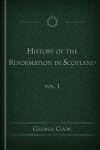
History of the Reformation in Scotland, vol. 1
- Author: George Cook
- Edition: 2nd
- Publisher: Archibald Constable and Co.
- Publication Date: 1819
- Pages: 398
George Cook wrote the History of the Reformation in Scotland to provide a historically accurate discussion of the politics, religious movement, and people of the Scottish Reformation. Where previous history texts of the period were often written based upon a few opinions, or without access to official documents, Cook has constructed one with full access to these documents, and many original sources to cross reference. Cook draws from many writers, and provides detailed citations with each reference to another text. The first volume contains two chapters of historical introduction to the period, and chapters 1–7 of the main text.
George Cook (1772–1845) was a fellow of the Royal Society of Edinburgh who received an honorary Doctor of Divinity from the University of St. Andrews the honorary degree, Doctor of Divinity. He authored The History of the Church of Scotland (3 vols.) A General and Historical View of Christianity, and Life of the Late George Hill, D.D.
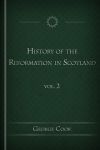
History of the Reformation in Scotland, vol. 2
- Author: George Cook
- Edition: 2nd
- Publisher: Archibald Constable and Co.
- Publication Date: 1819
- Pages: 418
George Cook wrote the History of the Reformation in Scotland to provide a historically accurate discussion of the politics, religious movement, and people of the Scottish Reformation. Where previous history texts of the period were often written based upon a few opinions, or without access to official documents, Cook has constructed one with full access to these documents, and many original sources to cross reference. Cook draws from many writers, and provides detailed citations with each reference to another text. The second volume contains chapters 8–18.
George Cook (1772–1845) was a fellow of the Royal Society of Edinburgh who received an honorary Doctor of Divinity from the University of St. Andrews the honorary degree, Doctor of Divinity. He authored The History of the Church of Scotland (3 vols.) A General and Historical View of Christianity, and Life of the Late George Hill, D.D.
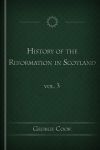
History of the Reformation in Scotland, vol. 3
- Author: George Cook
- Edition: 2nd
- Publisher: Archibald Constable and Co.
- Publication Date: 1819
- Pages: 418
George Cook wrote the History of the Reformation in Scotland to provide a historically accurate discussion of the politics, religious movement, and people of the Scottish Reformation. Where previous history texts of the period were often written based upon a few opinions, or without access to official documents, Cook has constructed one with full access to these documents, and many original sources to cross reference. Cook draws from many writers, and provides detailed citations with each reference to another text. The third volume contains chapters 19–27, as well as a detailed appendix.
George Cook (1772–1845) was a fellow of the Royal Society of Edinburgh who received an honorary Doctor of Divinity from the University of St. Andrews the honorary degree, Doctor of Divinity. He authored The History of the Church of Scotland (3 vols.) A General and Historical View of Christianity, and Life of the Late George Hill, D.D.
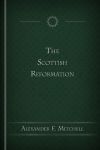
The Scottish Reformation
- Author: Alexander F. Mitchell
- Editor: Hay Fleming
- Publisher: William Blackwood and Sons
- Publication Date: 1901
- Pages: 330
Shortly before his death, Alexander F. Mitchell assembled this collection of lectures with the help of Hay Fleming. Mitchell assesses the outcome of the Reformation and the purpose it served in advancing the kingdom of God. The need for the Reformation is the lens Mitchell uses to discuss the key figures and movements that spurred it on. Included in The Scottish Reformation is a “Biographical Sketch of Dr. Mitchell,” 30 pages of detailed appendices, an addenda, and an index.
Alexander Ferrier Mitchell (1822–1899) was professor emeritus of church history at St. Andrews University. Plagued with health issues, Mitchell often found rest working in the solitude of his small farm. Even on his death bed, he never stopped studying Scripture and sharing his insight with others.
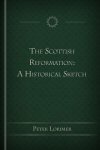
The Scottish Reformation: A Historical Sketch
- Author: Peter Lorimer
- Publisher: Richard Griffin and Company
- Publication Date: 1860
- Pages: 264
This volume provides a brief but concise study of the Reformation, broken into three major periods: the Hamilton Period, the Wishart Period, and the Knox Period. The Scottish Reformation: A Historical Sketch, includes information that only came to light through Lorimer’s historical research. This book also provides 25 beautiful illustrations of historically significant locations and buildings drawn by Birket Foster and engraved by W. J. Palmer.
Peter Lorimer (1812–1879) served for several years as an ordained minister in London before he was appointed professor of theology at the English Presbyterian College. In 1857, the college of New Jersey conferred on him the honorary degree, Doctor of Divinity. In 1878, he became the the English Presbyterian College’s first principal.
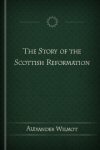
The Story of the Scottish Reformation
- Editor: Alexander Wilmot
- Publisher: Burns and Oates
- Publication Date: 1883
- Pages: 191
The Story of the Scottish Reformation provides a Catholic perspective of the events that transpired during the Reformation. Wilmot discusses the beliefs of the people involved and interprets the reasoning behind the actions of each party. Wilmot expresses his frustration with the political and social systems that allowed violence and oppression to take place, and cites the original sources his writing is largely based upon.
Alexander Wilmot was a Cape Town politician and Fellow of the Royal Geographical Society.
- Title: Classic Studies on the Scottish Reformation
- Authors: George Cook, George Christie, Alexander F. Mitchell, Peter Lorimer, A. Wilmot
- Publishers: Archibald Constable and Co., Peter Hill and Co., Hurst, Robinson, and Co., William Blackwood and Sons, Richard Griffin and company, Burns and Oates
- Volumes: 7
- Resources: 5
- Pages: 2,311
- Format: Digital › Logos Research Edition
- Resource ID: {2DBD43C7-C3D0-4B02-88BF-5C9B6C281091}
- The Influence of Letters on the Scottish Reformation by George Christie
- History of the Reformation in Scotland, vol. 1, 2nd ed. by George Cook
- History of the Reformation in Scotland, vol. 2, 2nd ed. by George Cook
- History of the Reformation in Scotland, vol. 3, 2nd ed. by George Cook
- The Scottish Reformation by Alexander F. Mitchell
- The Scottish Reformation: A Historical Sketch by Peter Lorimer
- The Story of the Scottish Reformation by Alexander Wilmot
In The Influence of Letters on the Scottish Reformation, George Christie explores the literature which impacted this period in history. Christie seeks to provide the most beneficial study of the subject by conducting more detailed discussion of what other historical examinations often skim over, and condensing sections frequently covered elsewhere. “Lovers of good Scots may also find here matter of interest.”
George Christie (1870–1937) received the majority of his education at the University of St. Andrews, where he was eventually given the honorary degree of Doctor of Divinity. In 1897 Christie was ordained to the church and parish of Renton. He then ministered for nearly 30 years at St. Andrew’s Parish in Edinburgh.

History of the Reformation in Scotland, vol. 1
- Author: George Cook
- Edition: 2nd
- Publisher: Archibald Constable and Co.
- Publication Date: 1819
- Pages: 398
George Cook wrote the History of the Reformation in Scotland to provide a historically accurate discussion of the politics, religious movement, and people of the Scottish Reformation. Where previous history texts of the period were often written based upon a few opinions, or without access to official documents, Cook has constructed one with full access to these documents, and many original sources to cross reference. Cook draws from many writers, and provides detailed citations with each reference to another text. The first volume contains two chapters of historical introduction to the period, and chapters 1–7 of the main text.
George Cook (1772–1845) was a fellow of the Royal Society of Edinburgh who received an honorary Doctor of Divinity from the University of St. Andrews the honorary degree, Doctor of Divinity. He authored The History of the Church of Scotland (3 vols.) A General and Historical View of Christianity, and Life of the Late George Hill, D.D.

History of the Reformation in Scotland, vol. 2
- Author: George Cook
- Edition: 2nd
- Publisher: Archibald Constable and Co.
- Publication Date: 1819
- Pages: 418
George Cook wrote the History of the Reformation in Scotland to provide a historically accurate discussion of the politics, religious movement, and people of the Scottish Reformation. Where previous history texts of the period were often written based upon a few opinions, or without access to official documents, Cook has constructed one with full access to these documents, and many original sources to cross reference. Cook draws from many writers, and provides detailed citations with each reference to another text. The second volume contains chapters 8–18.
George Cook (1772–1845) was a fellow of the Royal Society of Edinburgh who received an honorary Doctor of Divinity from the University of St. Andrews the honorary degree, Doctor of Divinity. He authored The History of the Church of Scotland (3 vols.) A General and Historical View of Christianity, and Life of the Late George Hill, D.D.

History of the Reformation in Scotland, vol. 3
- Author: George Cook
- Edition: 2nd
- Publisher: Archibald Constable and Co.
- Publication Date: 1819
- Pages: 418
George Cook wrote the History of the Reformation in Scotland to provide a historically accurate discussion of the politics, religious movement, and people of the Scottish Reformation. Where previous history texts of the period were often written based upon a few opinions, or without access to official documents, Cook has constructed one with full access to these documents, and many original sources to cross reference. Cook draws from many writers, and provides detailed citations with each reference to another text. The third volume contains chapters 19–27, as well as a detailed appendix.
George Cook (1772–1845) was a fellow of the Royal Society of Edinburgh who received an honorary Doctor of Divinity from the University of St. Andrews the honorary degree, Doctor of Divinity. He authored The History of the Church of Scotland (3 vols.) A General and Historical View of Christianity, and Life of the Late George Hill, D.D.

The Scottish Reformation
- Author: Alexander F. Mitchell
- Editor: Hay Fleming
- Publisher: William Blackwood and Sons
- Publication Date: 1901
- Pages: 330
Shortly before his death, Alexander F. Mitchell assembled this collection of lectures with the help of Hay Fleming. Mitchell assesses the outcome of the Reformation and the purpose it served in advancing the kingdom of God. The need for the Reformation is the lens Mitchell uses to discuss the key figures and movements that spurred it on. Included in The Scottish Reformation is a “Biographical Sketch of Dr. Mitchell,” 30 pages of detailed appendices, an addenda, and an index.
Alexander Ferrier Mitchell (1822–1899) was professor emeritus of church history at St. Andrews University. Plagued with health issues, Mitchell often found rest working in the solitude of his small farm. Even on his death bed, he never stopped studying Scripture and sharing his insight with others.

The Scottish Reformation: A Historical Sketch
- Author: Peter Lorimer
- Publisher: Richard Griffin and Company
- Publication Date: 1860
- Pages: 264
This volume provides a brief but concise study of the Reformation, broken into three major periods: the Hamilton Period, the Wishart Period, and the Knox Period. The Scottish Reformation: A Historical Sketch, includes information that only came to light through Lorimer’s historical research. This book also provides 25 beautiful illustrations of historically significant locations and buildings drawn by Birket Foster and engraved by W. J. Palmer.
Peter Lorimer (1812–1879) served for several years as an ordained minister in London before he was appointed professor of theology at the English Presbyterian College. In 1857, the college of New Jersey conferred on him the honorary degree, Doctor of Divinity. In 1878, he became the the English Presbyterian College’s first principal.

The Story of the Scottish Reformation
- Editor: Alexander Wilmot
- Publisher: Burns and Oates
- Publication Date: 1883
- Pages: 191
The Story of the Scottish Reformation provides a Catholic perspective of the events that transpired during the Reformation. Wilmot discusses the beliefs of the people involved and interprets the reasoning behind the actions of each party. Wilmot expresses his frustration with the political and social systems that allowed violence and oppression to take place, and cites the original sources his writing is largely based upon.
Alexander Wilmot was a Cape Town politician and Fellow of the Royal Geographical Society.
Reviews
3 ratings
AeliusCicero
6/19/2014

Doug
11/22/2013

Dr. Justin B. Stodghill
11/5/2013
